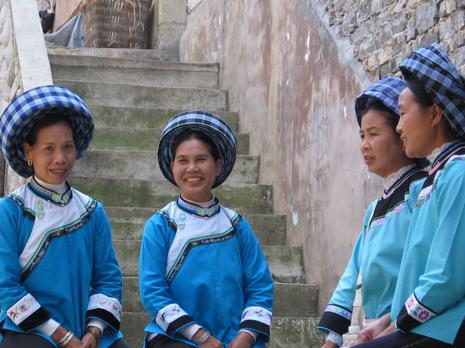
Buyi people are very kind with the travelers and foreigners. Among them it is customary to offer food and drink to any person that arrives to their homes.
Their basic food is rice, and their main economic activity, rice agriculture. They are fond of glutinous rice and dog meat.
Their houses are made of wood in some areas, or of stone, as around Huangguoshu waterfalls, where the Buyi villages are extraordinary beautiful.
Buyi funeral is very special. After somebody dies, his relatives would wash him, comb his hair, shave him and dress him again. Then the corpse will be placed on a bed, where the friends and relatives would pay their respects. When the visitors have pay their respects, they lay the corpse in a coffin and the people give a last farewell beating the bronze drum. Afterwards the drum will be beaten three times every day, in the morning, noon and night. It is a way of call the spirits to carry the deceased soul to paradise.
The belief of the drum sound as a way to communicate with the underworld is widely extended in China and Asia. In south and southwest China the bronze drum has a sacred character. Bronze drums are the treasure of every village; its sound is used in their most important ceremonies.
Buyi, Zhuang, Yao, Yi and many peoples with small population all worship the Bronze Drum and have ceremonies to honour it.
The Buyi dress in a varied and rich ways, with the shape of their clothes and headdress related to many factors affecting their live.
First we have four main regional dressing fashions that correspond with the regions where their four main dialects are spoken:
But there us also a great variation according to others factors, as:
- Religious factors. If there are designs of water they reflect the cult of the water among them. If their totem is the fish, the dragon it will be embroidered in their clothes. Mountains and other nature powers are usually present in their clothes.
- Their dress is also related with their local customs and main festivals and celebrations. In the big festivals or wedding parties, the women like to wear their best clothes, what will show the other people her ability embroidering.
- The clothes they wear are intimately related with their age and their sexual status. The different steps in the life of a woman are clearly depicted in their dresses.
- Beauty: clothes still keep their traditional function of show the beauty of the wearer.





